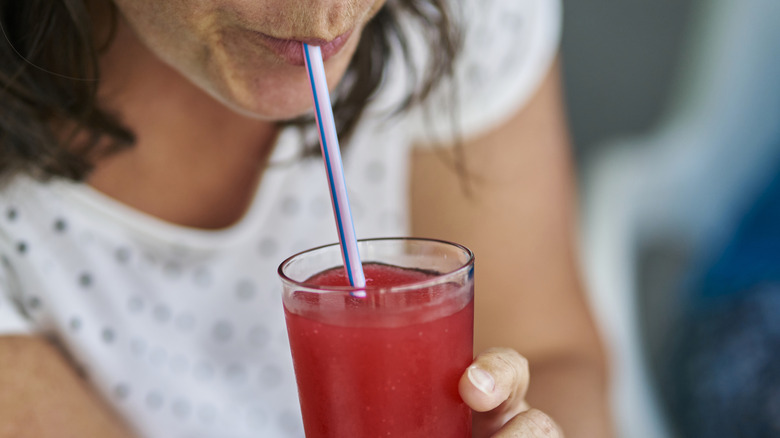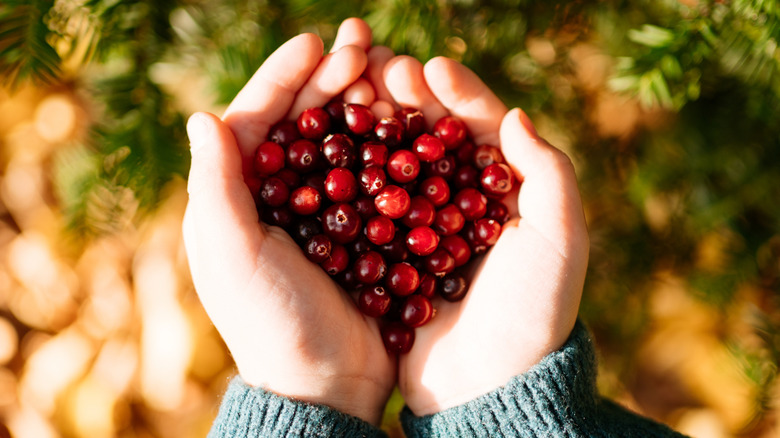Drinking Cranberry Juice Every Day Has An Unexpected Effect On Your Arteries
Your arteries shuttle blood to and from your heart. Over time, though, they can start to become clogged with plaque, which is partially made up of lingering amounts of cholesterol in addition to fat, calcium, and other substances, according to the Cleveland Clinic. When that occurs, their effectiveness can become compromised as they harden and lose their flexibility and performance ability. And that's a problem, because hardening of the arteries can lead to an increase in the risk of cardiovascular problems like heart attacks and stroke.
Knowing this, many people prioritize eating foods that can help sweep away the substances that can cause plaque to develop within the arteries. If you're among them, you may want to increase your intake of cranberry products like cranberry juice. Based on the results of some scientific experiments, cranberries appear to have an unexpected (and ultimately positive) effect on the arteries, enabling the arteries to keep doing their job more efficiently.
Consider a 2015 study in the Journal of Nutrition, for example. The study explored whether or not consuming two daily 240-milliliter doses of cranberry juice could affect cardiovascular health in human subjects. After eight weeks, adults who drank cranberry juice twice a day exhibited lower levels of triglycerides and decreased their diastolic blood pressure. Adults who drank a placebo for eight weeks didn't present similar outcomes. Consequently, researchers determined that cranberry juice could lower a person's chance of experiencing artery-related issues.
Natural compounds give cranberries functionality
Cranberry juice showed similar potential in the findings of a 2021 trial published in Nutrients. During the trial, midlife-age participants who were overweight or obese and had high blood pressure consumed 500 milliliters of cranberry juice daily for eight weeks. Their cranberry juice intervention seemed to reduce their diastolic blood pressure levels, if only modestly. Learning about findings like these may make you ask a natural question: Why would cranberries have such artery-specific beneficial properties? According to WebMD, the answer may be found in the anthocyanins contained in cranberries.
Anthocyanins are antioxidant compounds that may keep plaque from forming within the artery walls. Thanks to their wealth of nutrients like anthocyanins, cranberries are often referred to as functional foods; that is, they're foods that may serve health purposes beyond the obvious. A 2010 study in the Journal of Nutrition investigated how bioavailable cranberry anthocyanins might be in juice form, finding that more research is required about the exact dosage of cranberry product needed to elicit desired health results.
Variations between cranberry cultivars
There's another consideration to make when deciding whether or not to use cranberry juice as a means to protect your arteries: The amount of antioxidants and anthocyanins can vary between cranberry plants. Therefore, the cranberry cultivar used to produce a juice product may make a difference in how well the juice you drink helps keep your arteries from becoming clogged.
For instance, a 2022 study in Antioxidants examined the available amounts of antioxidants and anthocyanins in a range of popular types of cranberry plants. The researchers determined that two types of cranberries, Woolman and Le Munyon, held the most anthocyanins. However, unless you know exactly which type of cultivar was used to grow the cranberries in your juice, you probably can't be sure how many anthocyanins you're getting with each glass.
Even so, you may still want to sip up. As a 2024 review in Nutrients noted, cranberries generally have shown great promise as being friendly to the cardiovascular system. Consequently, if you drink a quality cranberry juice brand regularly, you are likely still helping your arteries.


